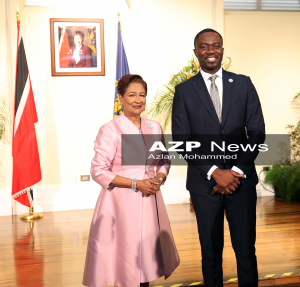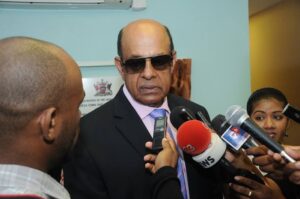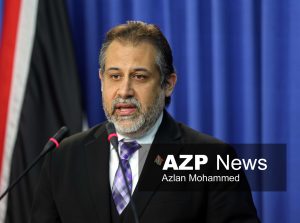By Sue-Ann Wayow
GOVERNMENT is banking on three major streams of revenue for the next financial year including increased production from the energy sector, a more efficient tax collection system and the introduction of the property tax.
Finance Minister Colm Imbert said it is anticipated that $6 billion more will be generated in 2022 than in 2021 from those avenues to arrive at an approximate $43 billion for this fiscal year.

On Monday, Imbert piloted the Appropriation (Financial Year -2022) Bill, 2021, in the Senate.
During his reading, Imbert reminded the Senate of measures announced in the Lower House on October 4 including food items that will be zero rated, subsidies for electrical and battery operated vehicles and fuel cash cards to help the most vulnerable.
With taxation, Imbert said government was currently receiving “a pittance” from the gaming industry that is not fully regularised and generates an income of some $16 billion annually.
He said, “As the Trinidad and Tobago Revenue Authority (TTRA) is established, we expect improved efficiency in tax collections so that a number of persons who are currently outside the tax net at this time would pay their fair share of taxes.”
Imbert added that Government was satisfied with the legislation created for the TTRA which includes the involvement of the Public Service Commission (PSC).
Imbert said the Gambling Control Commission board will be appointed soon to implement the gaming legislation that has already been passed in both Houses and the PSC was finalising the names for that board.
The minister said, “That Gaming Commission should be up and running in terms of establishing its procedures, engaging of hiring of staff… so that in 2022, we do expect to see significant improvement in revenue from the gaming and gambling sector.”
Precursor to the Property Tax
The Finance Minister also said government was continuing with its information collection drive ahead of the proposed Property Tax which is being led by the Valuations Division.
Valuations were being done for residential, commercial and agricultural properties and industrials will follow afterwards, he said.
Imbert said, “We expect at some point in time during fiscal 2022, w can initiate the process of collecting the property tax.”
Giving examples, he stated that based on evaluations, persons can pay up to $100 monthly for lower income earners and for a property that rents for about $10,000, calculations would work out to approximately $250 per month or $3000 annually.
Withdrawals from H&S Fund were interests only
THE withdrawals made by Government from the Heritage and Stabalisation Fund were from interests accrued and not the principle.
The fund currently stands at US $5.6 billion “ the same amount that it was in September 2015 six years ago,” Imbert said.
“The Heritage and Stabilisation Fund has maintained its value and all we have done over the last six years is to withdraw the interest earned by the Fund. We have not withdrawn the principle that was standing in the Fund in September 2015,” he said.

Best ratings in the Caribbean
The Finance Minister also said that Trinidad and Tobago’s economy has not suffered as badly as other Caribbean countries.
Referring to investment ratings by Standard & Poor’s, Imbert said it was no easy task to get the rating the country received while low, was still good compared to the region.
He said, “Our credit rating with Standard and Poor’s is better than a number of countries in the region… Trinidad and Tobago rating is among the best in the Latin and Caribbean region and is the best in the Caricom by far.”
Plans for institutions
Imbert also said there were plans to bring to the Parliament, legislation to allow the Unit Trust Corporation more flexibility to maximise its returns on its investment portfolio.
The merger of the Trinidad and Tobago Mortgage Finance Company (TTMF ) and the Mortgage Bank was on the table to create a new entity called the Trinidad and Tobago Mortgage Bank of which there will be a pubic offering of shares Imbert said.
“ That is expected to be completed in fiscal 2022 and would provide much more flexibility for persons in accessing mortgages.”
There will also be a merger of InvestTT and ExportTT to restructure the country’s trade and investment institutional arrangements to increase ease of doing business and avoid duplication.
![]()














